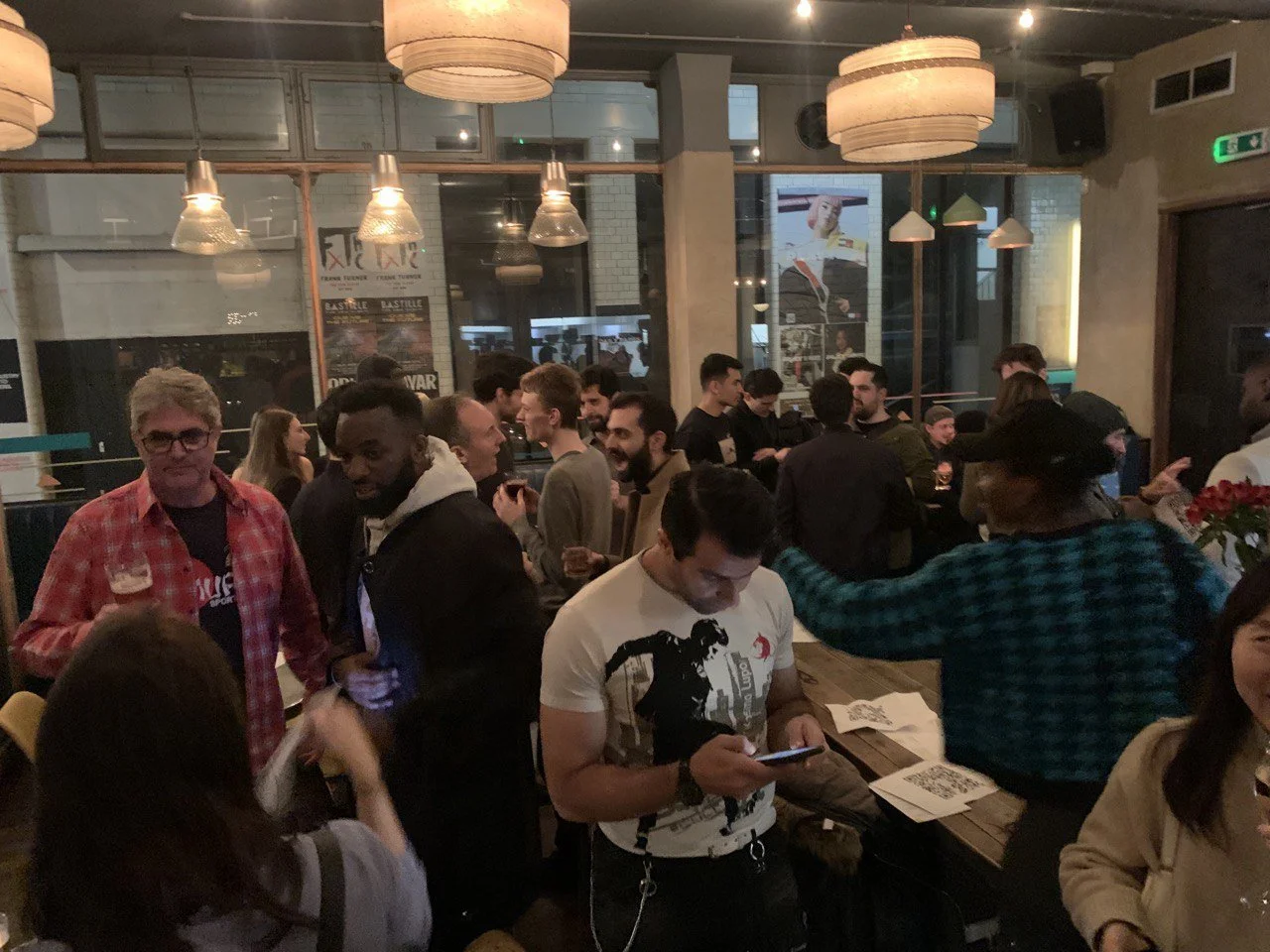TuesDAO Wants In-Person Web3 Meetups to be as Common as a Day of the Week
The female-founded TuesDAO is helping put London’s web3 people together

above: The first TuesDAO meet up photo: Elle Sia
About 15 people gathered at Market Place Bar, a pub in London’s Soho neighborhood with a confounding 10 p.m. closing time (the bane of London living for late-night tipplers). To be fair it was Tuesday, which meant the pub was relatively quiet and partially filled by TuesDAO, a London-based group supporting web3 builders through in person meetups.
Not to be confused with MonDAO, WednesDAO, ThursDAO or FriDAO, the organization prioritizes real-life meetings with its motto of "Empower each other, build together." That mentality has fostered a community of more than 600 people who have had 206,602 “meaningful conversations” – according to the website – since it was launched in February.
Anyone can apply to join the decentralized autonomous organization’s (DAO) community, which organizes on Telegram and shares web3 job opportunities, events, and “alpha” – an investment term of endearment in crypto describing a key edge for beating the market, or insight into the next big crypto project.TuesDAO focuses on creating a community specifically for folks who already work in web3 and are building those next big projects.
“There are already communities for web3 enthusiasts that gather anyone and everyone – which is a great thing, we need those communities as well,” co-organizer Paul-Adrien Lamoureux told me. “But web3 moves so fast that you also need interaction between people that are right in the scene.”
TuesDAO was founded by two women, Elle Sia, a web3 investment director at Digital Strategies, and Alice Boucher, a web3 builder with a background in management consulting.
“We meet every week IRL which allows us to shoot the breeze and get very intimate with each other,” Sia told me via Telegram. Boucher added: “Members genuinely support each other (with tips, connections every day), whenever they can and we have a high a activity ratio for this reason – it's a genuine community of builders helping each other.”
Check out the TuesDAO web site
Lamoureux joined the community a few days after TuesDAO hosted its first event in February, becoming a late-joining founder. He signed on after identifying with the DAO’s mission and meeting Sia and Boucher, whom he believed had the ability to achieve the DAO’s goals.
“TuesDAO is where people can connect with the most talented people in the space, and find a potential founder, the best engineers, to get funding,” he said. “And we are also always open to students because we need as much new blood in the space as possible…we try to be as inclusive as we can while keeping the vision.”
When I arrived I grabbed a pint and squeezed my way back into the corner booth. Unknowingly I sat next to Lamoureux, who introduced himself as the co-founder and CEO of Sentr3, a social platform oriented around token-gating for non-fungible token (NFT) creators and collectors. He noted the projects I’m involved with on his phone before adding me to Telegram – which he repeated with the other folks sitting around us.
For about an hour I chatted with a revolving crew of builders, discussing how smart contract wallets remove the need for difficult-to-remember seed phrases, and about new DAO platforms with novel governance mechanisms that more fairly account for both financial and social participation. We talked about music NFTs as a promising but incipient salvo for the streaming model, and about ‘DAOifying’ councils – the local government associations in London – so things like street cleaning become cooperative efforts with on-chain transparency.
The unifying theme was iterative progress toward adoption – how do we bring these new models to more people? How do we reduce friction for the day-to-day wanderer? In that sense the topics were fitting of the DAO, one so simple it's named after a day of the week. Tuesday's a reminder of our shared human experience, it’s a work day and brings us into contact with quotidian – but important – tasks like street cleaning.
But one crucial element of the human experience has yet to manifest in the web3 movement. Although TuesDAO is a women-led initiative, there were mostly white men present while I was there. Admittedly, my experience brought me into contact with a very small sample of the 600-person strong DAO. It may have been an anomaly.
Still, it was a reminder of the importance of centering diversity, equity and inclusion in builders’ mindsets. If our rubric for inclusion is previous experience, we need to be particularly intentional that we don’t recreate a web2 work culture that is defined by playing catch-up – where women and marginalized communities have to perform outsized work to fit into a professional landscape built disproportionately by white men.
A community that prioritizes that wherewithal – especially one focused on the next generation of web3 founders and builders – has an opportunity to flip the script. Hopefully inclusion becomes as natural a convention as Tuesday.

